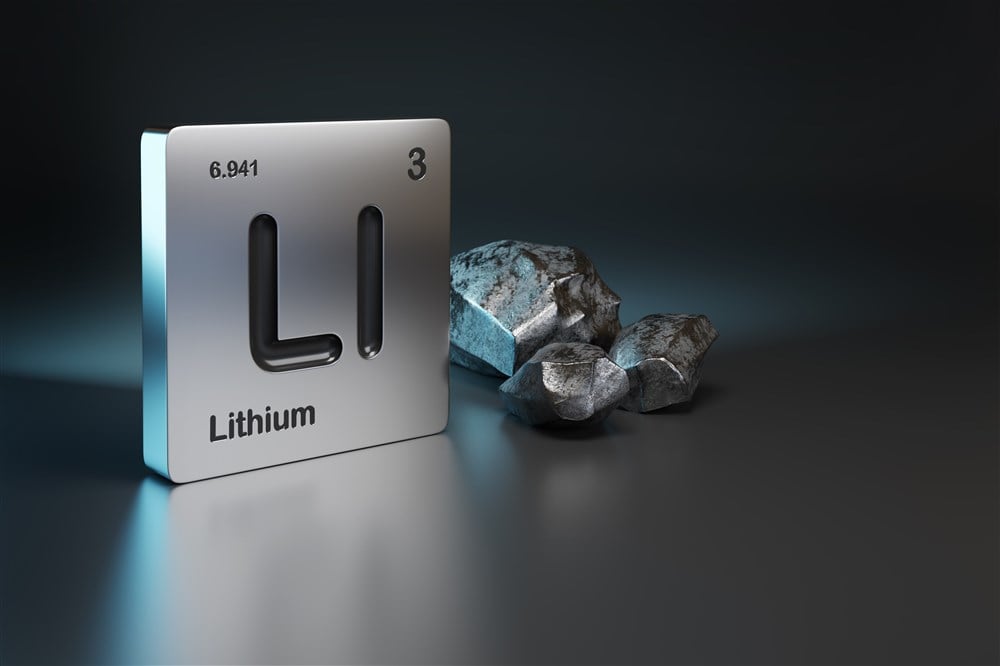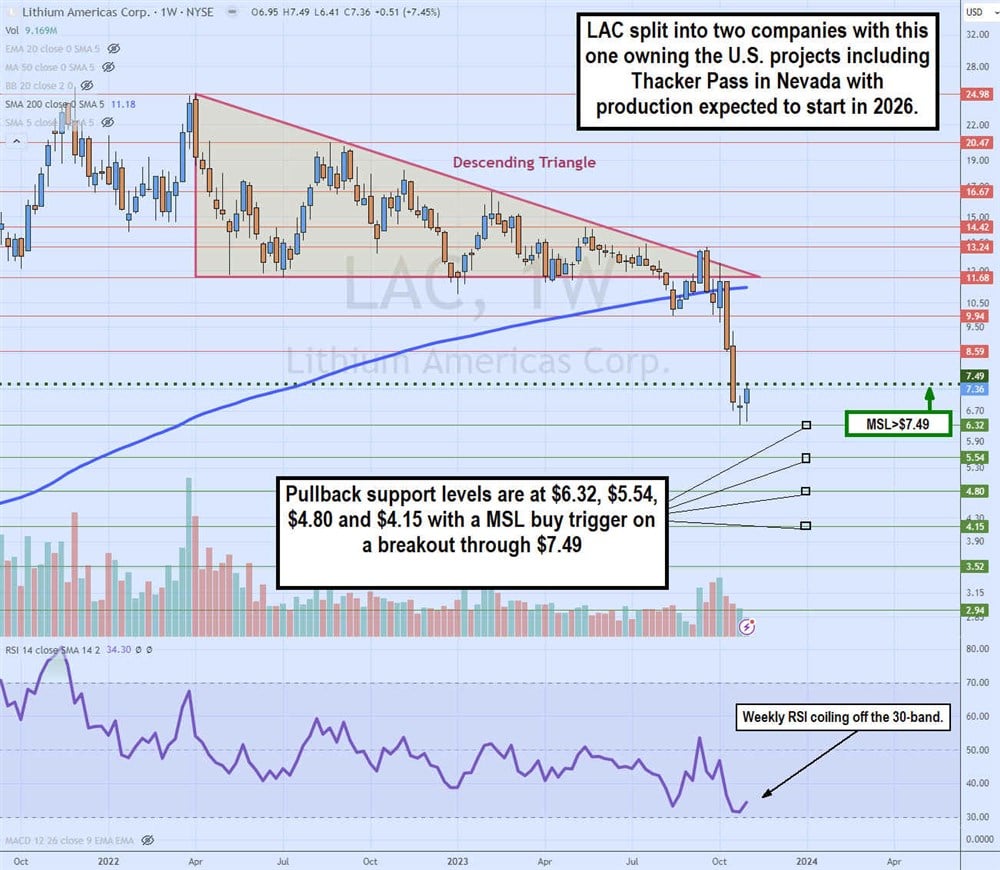
Lithium is the key element required for electric vehicle (EV) batteries. As demand for EVs grows, so does the need for battery-grade lithium. The top lithium-producing countries are China, Chile, Australia, and Argentina. It's a light and highly reactive alkali metal providing strong energy storage potential and is the preferred choice to power EVs. It enables batteries to hold a longer charge. Lithium has the lowest density of any metal, allowing it to float on water, not that it should come anywhere near contact with water.
A typical EV battery contains eight kilograms or 17 pounds of lithium per kilowatt-hour (kWh). A typical EV can contain 30 to 100 kilograms or 66 to 220 pounds of lithium. A Tesla Inc. (NASDAQ: TSLA) Model S battery contains 138 pounds of lithium and weighs 544 kilograms or 1,200 pounds. Nevertheless, the clean and renewable energy trend seems to be losing steam, as evidenced by market sell-offs in associated stocks, except uranium producers. However, risk-tolerant speculators may take a look at these three lithium stocks.
Lithium Americas Co. (NASDAQ: LAC)
Based in Vancouver, Canada, Lithium Americas is a Canadian mining company producing lithium at its Cauchari-Olaroz brine joint project in Argentina. It also owns and is developing the Thacker Pass lithium project in Nevada. Thacker Pass is expected to commence production in 2026. It is the largest known lithium mining property in the U.S.
Lithium Americas split into two independent public companies on October 3, 2023. Lithium Americas owns 100% of the Thacker Pass project in northern Nevada. Construction commenced in 2023 after years of setbacks and legal challenges. Thacker Pass is the largest measured and indicated lithium resource in the United States. Due to the split, the U.S. government may be more inclined to accelerate lithium production in the country. Deliveries are not expected until 2026.
Analyst actions
On October 16, 2023, B. Riley Securities started coverage of LAC with a Buy rating at a $14 price target. On October 18, 2023, Deutsche Bank downgraded LAC to a Hold from Buy and cut its price target to $7 from $25. Canaccord Genuity started coverage of LAC with a Speculative Buy rating on October 31, 2023. Scotiabank analyst Ben Isaacson believes investors will prefer LAC over LAAC and commented that Lithium Americas is on track to becoming a major lithium producer.
Lithium Americas analyst forecasts can be found on MarketBeat.

Weekly descending triangle breakdown
The weekly candlestick chart on LAC illustrates a weekly descending triangle breakdown pattern. The descending trendline commenced at $24.98 in April 2022, falling to the flat-bottom horizontal trendline at $11.68 by May 2022. The lower highs and flat lows continued to create the descending triangle until the breakdown occurred in September 2023 as LAC plunged through the daily 200-period moving average at $11.18, collapsing to $6.32 in October 2023 and coiling to form a weekly market structure low (MSL) buy trigger on a $7.49 break. The weekly relative strength index (RSI) oscillator attempts to bounce off the 30-band. Pullback support levels are at $6.32, $5.54, $4.80 and $4.15.
Lithium Americas Argentina Co. (NYSE: LAAC)
The other company resulting from the split is Lithium Americas Argentina or Lithium Argentina. This company owns all the Argentinian properties and projects. This is the Cauchari-Olaroz lithium brine project, slated to produce 40,000 tonnes per year of lithium carbonate equivalent (LCE). The project is in the ramp-up stage to reach full production. It's a jointly owned project with China's Gangfeng Lithium, which owns the majority, 55.2%, and LAAC owns 44.8%.
LAAC owns the Pasto Grandes lithium brine project slated to start commercial production in 2024, projected to produce 24,000 tonnes of LCE per year with an estimated 40-year life span. The Sal de la Puna project in the Salta Province is another joint venture operated by LAAC with a 65% stake, with Ganfent Lithium owning the other 35%.
Analyst actions
Cowen started coverage with an Outperform rating on LAAC and a $14 price target. Analysts were optimistic about the Cauchari project having a robust portfolio of future growth projects, and its partnership with Ganfeng sets the stage for multiple opportunities turning to Pastos Grandes. Deutsche Bank started coverage with a Buy and $11 price target. Canaccord Genuity also upped its rating on LAAC to a Speculative Buy.
Lithium Americas Argentina analyst ratings and price targets are at MarketBeat. Competitor and peer stocks can be found with the MarketBeat stock screener.
Livent Co. (NYSE: LTHM)
Livent is a global lithium technology company that produces and sells lithium compounds for high-performance lithium products ranging from batteries to pharmaceuticals to polymers and aerospace alloys. It's one of the largest lithium producers in America and is already generating revenues and earnings. The company is expanding its production capabilities with facilities under construction in North Carolina and Argentina.
It's contracted with Ford Motor Co. (NYSE: F) to deliver up to 13,000 metric tons of lithium hydroxide annually for 11 years at its Lithium Hydroxide Plant in early-stage construction in Quebec, Canada. Commercial production is expected to commence in 2026 with a capacity of 34,000 metric tons per year of lithium hydroxide. The company is also awaiting a shareholder vote to acquire Australia-based Allkem Ltd to become the world's third-largest lithium producer, with the potential for 248,000 metric tons of annual production.
Earnings slow down
On October 31, 2023, Livent reported Q3 2023 GAAP EPS of 44 cents, missing analyst expectations of 48 cents by 4 cents. Revenues fell 8.7% YoY to $211.4 million, missing $264,41 consensus analyst estimates. Volumes sold were flat with lower average realized prices, which were partially offset by lower costs versus the prior quarter and year-ago period. Battery-graded lithium carbonate peaked at $81,375/tonne in December 2022, falling over 70% to $22,950/tonne in October 2023.
Downside guidance
Livent cut its full-year 2023 guidance, expecting revenues between $890 million and $940 million versus $1.04 billion consensus analyst estimates. Adjusted EBITDA is expected between $500 million to $530 million, down from earlier guidance of $530 million to $600 million.
Livent CEO Paul Graves commented, "We are working closely with our customers to meet their growing lithium demand needs as we prepare to meaningfully increase production volumes from our capacity expansions beginning in 2024." He continued, "Additionally, we remain on track to close our transformational merger with Allkem by around the end of this year. We look forward to combining our teams, assets and collective strengths to create a leading integrated global lithium company."
Livent analyst ratings and price targets are at MarketBeat.













